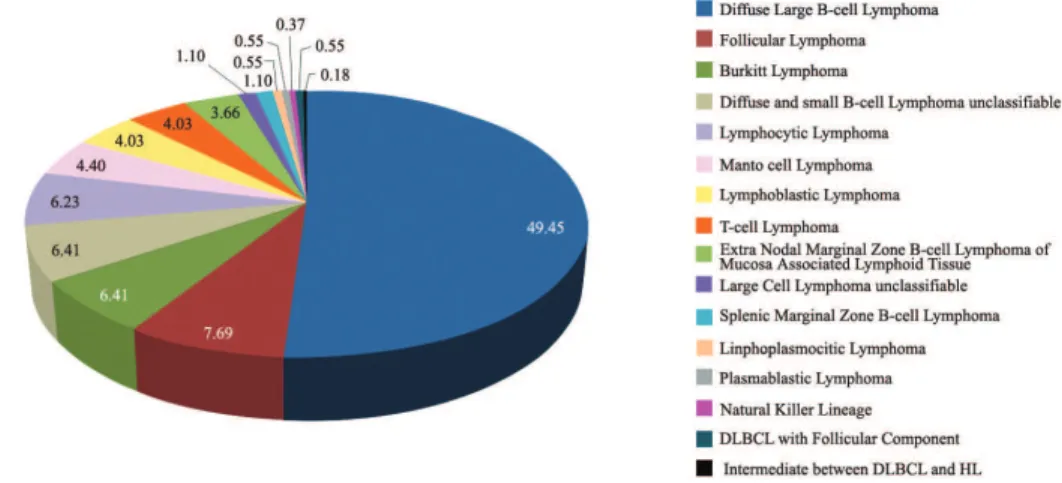Rev Bras Hematol Hemoter. 2011;33(4):315-22 317
Prevalence of non-Hodgkin lymphomas in São Paulo, Brazil
Immunopathology Laboratory, Hospital das Clínicas da Faculdade de Medicina da Universidade de São Paulo – HC-FMUSP, São Paulo, SP, Brazil
Gisele Rodrigues Gouveia Sheila Aparecida Coelho Siqueira Dalton de Alencar Fischer Chamone
Juliana Pereira
Conflict-of-interest disclosure: The authors declare no competing financial interest
Submitted: 3/2/2011 Accepted: 9/10/2011
Corresponding author:
Gisele Rodrigues Gouveia Hospital das Clínicas da Faculdade de Medicina da Universidade de São Paulo, Laboratório de Imunopatologia Av. Dr. Enéas Carvalho de Aguiar, 155, 1º Andar – Cerqueira César 05403-000 – São Paulo, SP, Brazil Phone: 55 11 3061-5544 gisele.gouveia@usp.br
www.rbhh.org or www.scielo.br/rbhh
DOI: 10.5581/1516-8484.20110085
Non-Hodgkin lymphomas (NHL) include several subgroups of malignancies arising as a result of a progressive accumulation of lesions in the genome of lymphoid cells (B, T or natural killer). Usually, 60% to 75% of NHL arise in lymph nodes but they originate in extranodal sites in 25% to 40% of cases.(1-3) In this situation
the most often tissues affected are the gastro-intestinal tract, skin, oral cavity, bone marrow, thyroid and central nervous system.(1)
NHL account for 4% of all human cancers and are more common in men, Caucasians and in over 50-year-old individuals.(3) The incidence of
NHL worldwide is increasing by 4% per year and is thus a concern for public health. This increase may be attributed to several factors including the early diagnosis of more cases of the indolent lymphoma, increases in the use of immunosuppressive drugs and the aging of the population.(1,4) There is great variation in the
frequency of the different subtypes of NHL in the different regions of the world. In Brazil, this information is still scarce and more research is needed.(4)
In order to know the frequency of the different subtypes of NHL in our population, a retrospective study was conducted in the
Departments of Hematology and Hematology and Pathology of the Hospital das Clinicas, Faculdade de Medicina da Universidade de São Paulo (FMUSP) and the Instituto do Câncer do Estado de São Paulo (ICESP), from July 2006 to February 2010.
The majority of cases (53.9%) were male, with a median age of 50 years old. The gastrointestinal tract was the main extranodal site involved, in particular the stomach. Involvement of the bone marrow at diagnosis was found in 17.71% of patients.
Out of the 683 cases evaluated, 546 (79.64%) were NHL, 128 (18.74%) were Hodgkin's lymphoma (HL) and 9 (1.32%) were unclassifiable.
The prevalences of the different subtypes of the NHL cases are shown in Figure 1. Similar to the literature, there was a predominance of B-cell phenotype. Diffuse large B cell lymphoma was the most common subtype followed by follicular lymphoma. However, despite of this, it was observed that the prevalence of follicular lymphoma was lower than that reported in American epidemiological data. The data related to age, gender and extranodal origin were in agreement with the literature.
References
1. Colleoni GW, Inaoka RJ. Linfomas não Hodgkin: aspectos clínicos, prognósticos e terapêuticos na era do rituximabe. Diálogo Científico. 2007; (Nov/Dec):19-22.
2. Klumb CE. Biologia e patogênese dos linfomas não-Hodgkin de origem B na infância: uma revisão. Rev Bras Cancerol. 2001;47(3):291-301.
3. World Health Organization (WHO). Pathology and genetics of tumours of haematopoietic and lymphoid tissues. Lyon: International Agency for Research on Cancer; 2008.
4. Silva-Neto MM, Jalil EM, Araújo IB. Linfomas não Hodgkin extranodais em Salvador - Bahia: Aspectos clínicos e classificação histopatoló-gica segundo a OMS - 2001. Rev Bras Hematol Hemoter. 2008;30(1):36-40.
Figure 1 – Prevalence of the NHL subgroups found at HC-FMUSP
xxx
